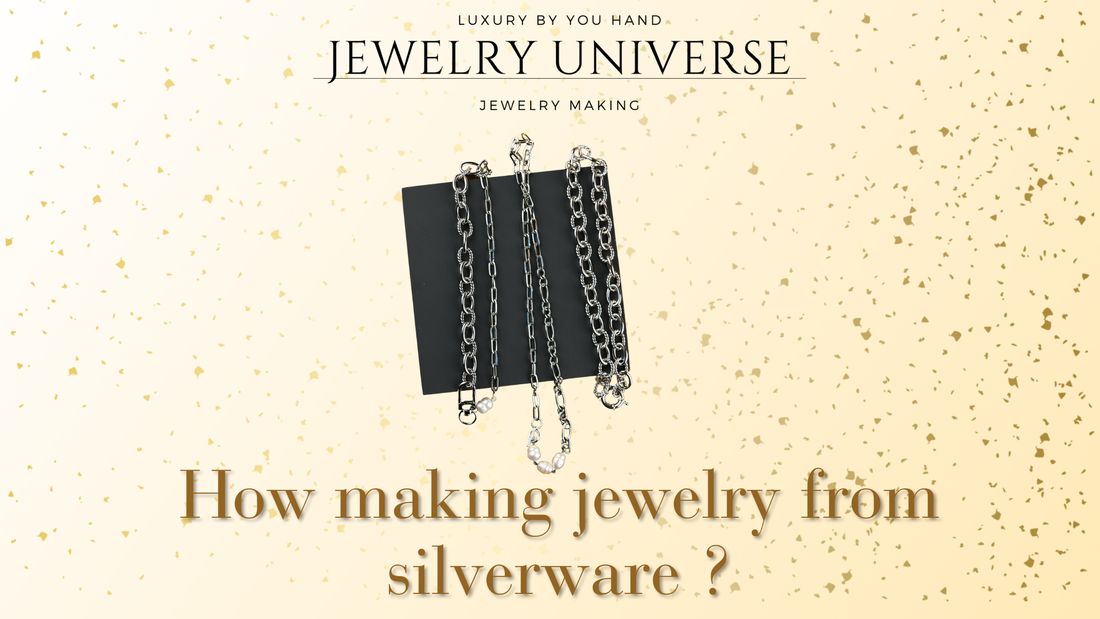
How making jewelry from silverware ?
Share
Repurposing silverware into jewelry is both an eco-friendly and artistic endeavor. It offers a way to recycle old utensils while creating unique, handmade pieces that stand out.
A rich history
This craft has historical roots, as people have been repurposing everyday items into adornments for centuries. Silverware jewelry combines practicality with artistic expression, making it a timeless technique.
The tools needed for silverware jewelry
Essential tools
To begin crafting jewelry from silverware, having the right tools is crucial. The basics include:
- A metal saw for precise cutting.
- A file to smooth edges.
- A mallet and anvil to shape and flatten silverware.
Optional equipment
For intricate designs, additional tools enhance the process:
- Rotary tools for engraving details.
- Jeweler's pliers for bending and shaping.
- Polishing cloths or machines to give the final piece a professional finish.
Selecting the right silverware
Types of utensils to use
Not all silverware is suitable for jewelry making. High-quality silver pieces, such as sterling silver or silver-plated utensils, are ideal. Common choices include:
- Spoons for pendants or rings.
- Forks for intricate bracelets or necklaces.
Where to source silverware
Finding the perfect silverware for jewelry involves a bit of treasure hunting. Local thrift stores, antique shops, and online marketplaces often have unique and vintage pieces.
Tips for sourcing silverware:
- Look for pieces with ornate handles or patterns.
- Verify if the silverware is genuine silver for easier shaping and higher value.
Techniques for crafting jewelry from silverware
Cutting and shaping
The first step involves cutting the silverware into the desired size and shape. This can be done using a metal saw or heavy-duty cutters.
Bending and forming
Using pliers and a mallet, silverware can be bent into various forms such as rings, cuffs, or curved pendants. A vise can help secure the piece during this process.
Polishing and finishing
Once shaped, polishing brings out the shine and removes any rough edges. Buffing wheels or polishing creams are effective for achieving a mirror-like finish.
Popular silverware jewelry designs
Rings from spoon handles
Spoon handles are particularly versatile, making elegant rings with intricate designs.
Bracelets from fork tines
The prongs of forks can be bent into stunning patterns, resulting in unique cuff bracelets.
Other creative ideas:
- Necklaces with engraved spoon bowls.
- Earrings crafted from smaller utensil parts.
Advantages of making jewelry from silverware
Eco-friendliness
Repurposing old utensils reduces waste, giving them a second life as beautiful jewelry.
Customization
Each piece is unique, allowing artisans to experiment with styles and designs. This ensures one-of-a-kind creations that reflect personal tastes.
Challenges in working with silverware
Material hardness
Silverware, especially stainless steel pieces, can be tough to manipulate. Using heat can soften the material and make it easier to work with.
Avoiding damage
Maintaining the integrity of the original patterns and designs requires careful handling, especially during bending and shaping.
Tips for beginners
Start with softer metals
Beginners should opt for sterling silver, which is easier to work with compared to harder alloys.
Practice on inexpensive pieces
Before using valuable silverware, practicing on inexpensive items can help refine techniques and build confidence.
Beginner’s checklist:
- Basic tools for cutting and bending.
- Protective gloves for safe handling.
- A simple design template for guidance.
Selling and gifting silverware jewelry
Craft fairs and online platforms
Handmade silverware jewelry is highly marketable. Selling at local craft fairs or through online platforms like Etsy can turn a hobby into a business.
Personalized gifts
Creating personalized jewelry from family silverware makes for meaningful gifts that carry sentimental value.
Expanding your skills
Attending workshops
Workshops on metalworking or jewelry making provide hands-on experience and access to professional tools.
Exploring advanced techniques
Adding gemstones, engraving initials, or experimenting with mixed metals can elevate the complexity and appeal of your creations.
Embracing the art of making jewelry from silverware opens up a world of creativity and sustainability, allowing anyone to transform everyday objects into timeless accessories.
